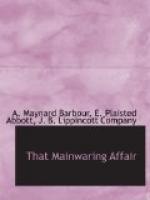“Having satisfactorily disposed of Hugh Mainwaring (as the dead man now seemed to my over-wrought imagination), I made preparation for my immediate departure. This occupied little time. There was fortunately some cash in the safe, which I took; all drafts and papers of that nature I left, — they were of value only to Hugh Mainwaring, and he was dead! As the cash would be inadequate, however, for my needs, I decided after considerable deliberation to take the family jewels, though not without apprehension that they might lead to my detection, as they finally did. These I put in a small box covered with ordinary wrapping-paper to attract as little attention as possible,’ and, having completed my preparations, I removed the bandage from the dead man’s head and threw it with the private keys to my library into the metallic box which had held the jewels. Then donning the black wig and mustache which my visitor had thrown aside on disclosing his identity, together with a long ulster which he had left in the tower-room, I took one farewell look at the familiar apartments and their silent occupant and stole noiselessly out into the night. I remained on the premises only long enough to visit the small lake in the rear of the house, into which I threw the metallic box and its contents, then, following the walk through the grove to the side street, I left Fair Oaks, as I well knew, forever. While yet on the grounds I met my own coachman, but he failed to recognize me in my disguise. My plans were already formed. I had come to the conclusion that my late visitor and the caller of the preceding afternoon, whose card bore the name of J. Henry Carruthers, were one and the same. My secretary had stated that Carruthers had come out from the city that day, so my appearance at the depot, dressed in his own disguise, would probably attract no attention. I was fortunate enough to reach the depot just as two trains were about to pull out; the suburban train which would leave in three minutes for the city, and the north-bound express, due to leave five minutes later. I bought a ticket for New York, then passing around the rear of the suburban train, quietly boarded the express, and before the discovery of that night’s fearful tragedy I was speeding towards the great West.
“But go where I might, from that hour to this, I have never been free from agonizing remorse, nor have I been able for one moment to banish from my memory the sight of that face, — the face of my brother, killed by my own hand, and a discovery which I made within the first few hours of my flight made my remorse ten times deeper. In going through the pockets of the suit I wore I found a letter from my brother, addressed to his son, written in my own library and at my own desk while he awaited my coming. He seemed to have had a sort of presentiment that his interview with me might end in some such tragedy as it did, and took that opportunity to inform his son regarding both his past work and his plans for the future. What was my astonishment to find that his son was, at that time, as totally unaware of his father’s existence as was I a few hours before of the existence of a brother!




